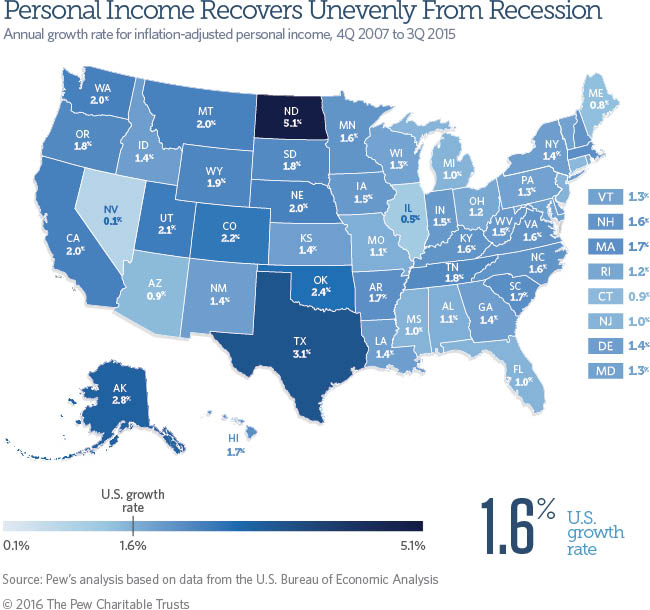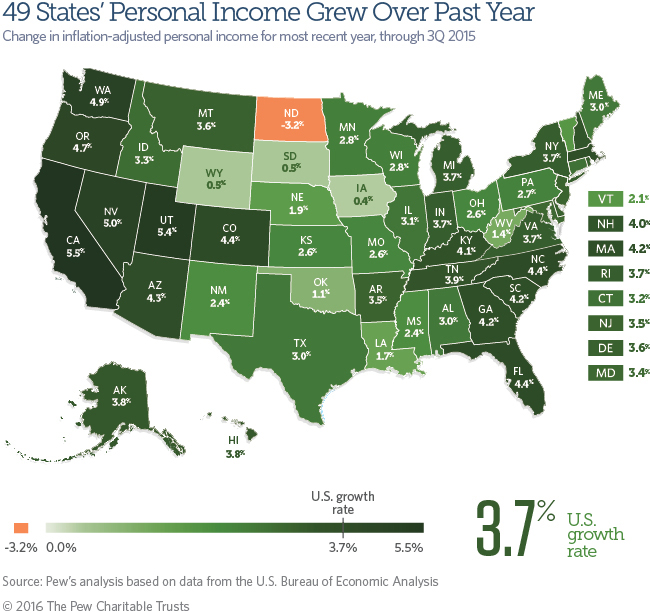Connecting state and local government leaders
There's some mixed news for growth in states since the Great Recession.
In a sign that the U.S. economic recovery is widespread, personal income in all states is back above levels seen at the Great Recession’s onset. But growth has varied among states, ranging from a constant annual rate of less than 1 percent in Nevada to more than 5 percent in North Dakota.
Although growth since the recession has been far-reaching, its pace has been slower than normal. Since the downturn began in the fourth quarter of 2007, estimated U.S. personal income has increased by a constant annual rate of 1.6 percent through the third quarter of 2015, compared with 2.8 percent over the past 30 years, after accounting for inflation.
The expansion was aided by a 3.7 percent growth rate over the most recent four quarters, after adjusting for inflation. All states but one—North Dakota—added to their post-recession gains in the past year.
Personal income estimates are widely used to track state economic trends. Comprising far more than simply employees’ wages, the measure counts all sorts of income received by state residents, including earnings from owning a business or investing, as well as benefits provided by employers or the government. As the economy expands or shrinks, state personal income also changes. These trends matter not only for individuals and families but also for state governments, because tax revenue and spending demands may rise or fall along with residents’ incomes.

Trends in Inflation-Adjusted Personal Income Since 2007, the Onset of the Recession:
- Personal income in 22 states grew faster than the national rate.
- North Dakota (5.1 percent) and other leading oil-producing states enjoyed the fastest annualized growth rates: Texas (3.1 percent), Alaska (2.8 percent), Oklahoma (2.4 percent), and Colorado (2.2 percent).
- Nevada, where home prices and construction earnings plunged when the housing bubble burst, had the slowest growth among all states and was the last to recover its personal-income losses after the recession. Personal income grew at an annualized rate of just 0.1 percent since the fourth quarter of 2007 and returned to 2007 levels only in mid-2015.
- After Nevada, Illinois (0.5 percent), Maine (0.8 percent), Arizona (0.9 percent), and Connecticut (0.9 percent) had the slowest annualized growth rates for personal income.

Trends in inflation-adjusted personal income for the most recent year, through the third quarter of 2015:
- Eighteen states outpaced U.S. growth in personal income.
- The fastest growth rates were in a cluster of Western states: California (5.5 percent), Utah (5.4 percent), Nevada (5.0 percent), Washington (4.9 percent), and Oregon (4.7 percent).
- One state had a drop in personal income: North Dakota (-3.2 percent). The state was hit by declining earnings in the farm and mining sectors.
- Three states’ personal income grew by less than 1 percent over the past year: Iowa (0.4 percent), Wyoming (0.5 percent), and South Dakota (0.5 percent). Farm earnings fell in all three states, although mining losses played a greater factor in Wyoming’s stunted growth.
Over the past year, personal income in 42 states grew faster than its pace since the end of 2007, accelerating those states’ economic expansions. In seven states—Iowa, Nebraska, Oklahoma, South Dakota, Texas, West Virginia, and Wyoming—personal income increased in the past year but at a slower pace than each state’s constant growth rate since the recession, moderating their growth trends. North Dakota—the only state with short-term negative growth—still enjoyed the greatest growth within the U.S. for inflation-adjusted personal income since the recession’s onset.
Although economic growth is widespread, states’ recovery from the recession is uneven. According to Pew’s Fiscal 50 research, 21 states still were collecting less tax revenue, after adjusting for inflation, in the second quarter of 2015 than at their individual peaks before or during the recession. Meanwhile, employment measuresshow that many states’ labor markets have yet to completely recover.
Some ups and downs since recession
The constant rate of growth between 2007 and 2015 masks volatility in personal income that occurred during individual calendar years. (See “Year-to-year growth” tab for annual results in each state between 2007 and 2014.)
Personal income fell in every state in calendar 2009. The country rebounded over the next three years: 49 states’ personal income rose in 2010—Nevada was the outlier—and all states saw increases in 2011 and 2012. In 2013, personal income fell in 39 states, reflecting a number of taxpayers shifting income to 2012 from 2013 to avoid potential increases in certain federal tax rates, and the expiration of other tax rates. The rebound resumed in 2014, with personal income rising in every state but Kansas.
What Is Personal Income?
Personal income tallies residents’ paychecks, Social Security benefits, employers’ contributions to retirement plans and health insurance, income from rent and other property, and benefits from public assistance programs such as Medicare and Medicaid, among other items.
Federal officials use state personal income to determine how to allocate support to states for certain programs, including funds for Medicaid. State governments use personal income statistics to project tax revenue, set spending limits, and estimate the need for public services.
Looking at personal income per capita or state gross domestic product, which measures the value of all goods and services produced within a state’s borders, can yield different insights on state economies.
Download the data to see state-by-state growth rates for personal income from 2007 through the third quarter of 2015. Visit The Pew Charitable Trusts’ interactive resource, Fiscal 50: State Trends and Analysis, to sort and analyze data for other indicators of state fiscal health.
This was originally published by The Pew Charitable Trusts' State Fiscal Health initiative. Analysis by Alex Boucher, Ruth Mantell, and Jennifer Thornton. (Photo by Tupungato / Shutterstock.com)

NEXT STORY: Cities Try $6, $8 Hourly Parking to Cut Congestion, Pollution



